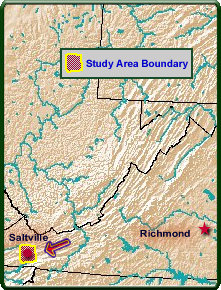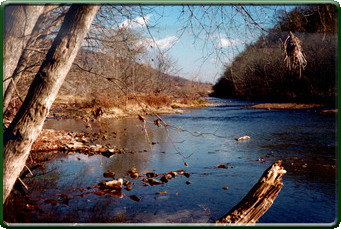Upper Midwest Environmental Sciences Center
|
|
| Home/ Overview/ Science Programs/ Data Library/ Products and Publications/States/ Rivers/Teachers and Students/ Links/ Contact/ Search |
Tree Swallows as Indicators of Mercury Bioaccumulation in the North Fork of the Holston River, Virginia
 The
North Fork of the Holston River (NFHR) is located in southwest Virginia
and northwest Tennessee. From 1951 to 1972, a chlor-alkali plant located
along the NFHR near Saltville, Virginia, discharged mercury contaminated
effluent into the NFHR.
The
North Fork of the Holston River (NFHR) is located in southwest Virginia
and northwest Tennessee. From 1951 to 1972, a chlor-alkali plant located
along the NFHR near Saltville, Virginia, discharged mercury contaminated
effluent into the NFHR.
During the 21 years of operation, as much as 100 pounds of mercury were lost daily to the settling ponds at the plant site and the NFHR. Numerous studies conducted between 1960 and 1980 identified high levels of mercury in sediment, water, and fish in the NFHR.
The primary objective of this investigation is to determine the bioavailability of environmental contaminants on the NFHR. Twenty or more tree swallow boxes will be put out on the NFHR above the chlor-alkali plant and 30 miles below the chlor-alkali plant.
Eggs and sibling 12-day-old tree swallow chicks will be collected from five boxes at each site. Reproductive success will be measured at each site.
Trace elements will be measured in the egg and chick sample. Egg and tissue concentrations for swallows will be compared to values that are considered elevated or toxic to other species.
Results from this study will be used by U.S. Fish and Wildlife Service
to evaluate exposure and effects of metal contamination to aquatic insectivores
nesting on the NFHR.
The project was terminated in September 2001.
Principal Investigator: Tom Custer



